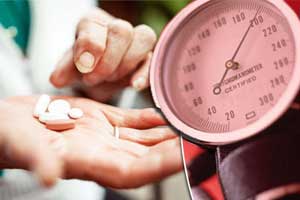- Home
- Editorial
- News
- Practice Guidelines
- Anesthesiology Guidelines
- Cancer Guidelines
- Cardiac Sciences Guidelines
- Critical Care Guidelines
- Dentistry Guidelines
- Dermatology Guidelines
- Diabetes and Endo Guidelines
- Diagnostics Guidelines
- ENT Guidelines
- Featured Practice Guidelines
- Gastroenterology Guidelines
- Geriatrics Guidelines
- Medicine Guidelines
- Nephrology Guidelines
- Neurosciences Guidelines
- Obs and Gynae Guidelines
- Ophthalmology Guidelines
- Orthopaedics Guidelines
- Paediatrics Guidelines
- Psychiatry Guidelines
- Pulmonology Guidelines
- Radiology Guidelines
- Surgery Guidelines
- Urology Guidelines
Polypill better than multiple pills for high blood pressure

Patients who are prescribed single-pill fixed-dose combination (FDC) treatment to manage their high blood pressure have better medication adherence and health outcomes as compared to those taking the same medication as separate pills, according to a new study published in the journal PLOS Medicine.
The study was conducted by Amol Verma, an internal medicine physician at St. Michael's Hospital, and colleagues to compare the medication adherence and clinical outcomes of multi-pill combination therapy versus FDC.
Hypertension affects an estimated 900 million adults worldwide and is the leading cause of global death or disability. About 75 percent of people with hypertension require more than one medication to control their blood pressure and many are prescribed multiple pills rather than a single-pill fixed-dose combination.
"Using single-pill combinations rather than multiple pills may represent a simple and potentially low-cost intervention that could substantially reduce the global burden of death and disability related to hypertension," said Dr. Verma.
Using databases housed at the Institute for Clinical Evaluative Sciences, Dr. Verma examined data on 13,350 people age 66 and older in Ontario who were prescribed at least two medications for hypertension, which is a significant risk factor for cardiovascular disease.
Based on the study, the researchers found that:
- people who received single-pill combinations had a significantly lower rate of the combined outcome of death or hospitalization for heart attack, heart failure or stroke and that these differences were related to the fact that patients are more likely to adhere to a regime of taking a single pill.
- There were 1,008 cardiovascular events among people who took multiple pills compared with 904 events in people who took a single combination pill.
- 14 percent fewer deaths for people taking the single combination pill - or potentially saving one in 40 lives over five years of treatment.
The study followed people for nearly four years on average. There were 1,008 cardiovascular events among people who took multiple pills compared with 904 events in people who took a single combination pill.
"Most patients need more than one medication to control blood pressure, but it is difficult to regularly take multiple medications. Single-pill combinations allow more intense treatment with simpler regimens. Our study is the first to show that single-pill treatment for hypertension is associated with improved outcomes."
For more information click on the link: https://doi.org/10.1371/journal.pmed.1002584

Disclaimer: This site is primarily intended for healthcare professionals. Any content/information on this website does not replace the advice of medical and/or health professionals and should not be construed as medical/diagnostic advice/endorsement or prescription. Use of this site is subject to our terms of use, privacy policy, advertisement policy. © 2020 Minerva Medical Treatment Pvt Ltd